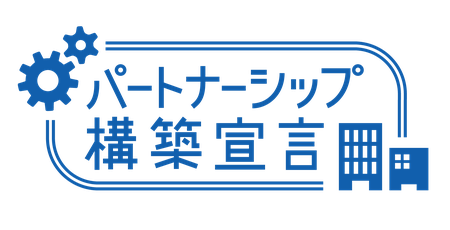AMADA Group's Partnership Building Declaration
AMADA Co., Ltd. (hereinafter referred to as "the Company") declares that the Company will focus on the following items in order to build new partnerships by promoting cooperation, coexistence and co-prosperity with business partners in the supply chain and with businesses that seek to create value.

Partnership Building Declaration
The Company will focus on the following items in order to build new partnerships by promoting cooperation, coexistence and co-prosperity with business partners in the supply chain and with businesses that seek to create value.
Coexistence and co-prosperity of the entire supply chain and new cooperation across scales and chains
We will work to add value to the supply chain as a whole by encouraging our direct business partners to work with their business partners beyond them (from "Tier N" to "Tier N+1"), and we will aim to build coexistence and co-prosperity with our business partners through collaboration that goes beyond existing business relationships and corporate size, etc. In doing so, from the perspective of business continuity and work style reform in the event of a disaster, etc., we will also promote support such as advice on the introduction of remote working and the formulation of business continuity plans (BCPs) for our business partners.
(Individual Items)
- We will improve the speed of information linkage with the supply chain and promote operational efficiency through visualization.
Compliance with the Promotion Standards
We will comply with desirable business practices between our parent and subcontractors (the "Promotion Standards" based on the Act on the Promotion of Subcontracting Small and Medium-sized Enterprises) and actively work to correct trade practices and business practices that hinder the establishment of partnerships with our business partners.
-
Pricing methods
We will not make unreasonable cost reduction requests. In determining the transaction consideration, if the subcontractor requests consultation, we will respond to the request and hold sufficient discussions with the subcontractor to include appropriate benefits for the subcontractor, including consideration of the impact of increased labor costs. In concluding a contract, including the determination of the transaction consideration, the parent company shall clearly indicate and deliver the terms and conditions of the contract in writing or otherwise.
-
Cost burden such as type management
We will promote the disposal of unnecessary molds, fully discuss with subcontractors the management and storage of necessary molds, and promote the return (take-back) of molds and payment of storage costs.
-
Terms of payment, such as bills
We will pay the subcontract price in cash whenever possible. When paying by bill, the subcontractor will not bear the discount fee, etc., and the payment cycle will be within 60 days.
-
Intellectual property and know-how
We do not require the conclusion of unilateral nondisclosure agreements, the disclosure of know-how by taking advantage of our business position, or the free transfer of intellectual property rights.
-
Negative effects associated with work style reform
To ensure that business partners are also able to respond to changes in work styles, we do not place orders to subcontractors for short delivery times or change specifications at short notice without appropriate cost burdens. In the event of a disaster, etc., we will not impose a one-sided burden on subcontractors in terms of business transactions, and when business resumes, etc., we will give consideration to the continuation of business relationships, etc., as much as possible.
Representative Director, President
Takaaki Yamanashi
Contact for repair/recovery of AMADA products and our corporate activities.